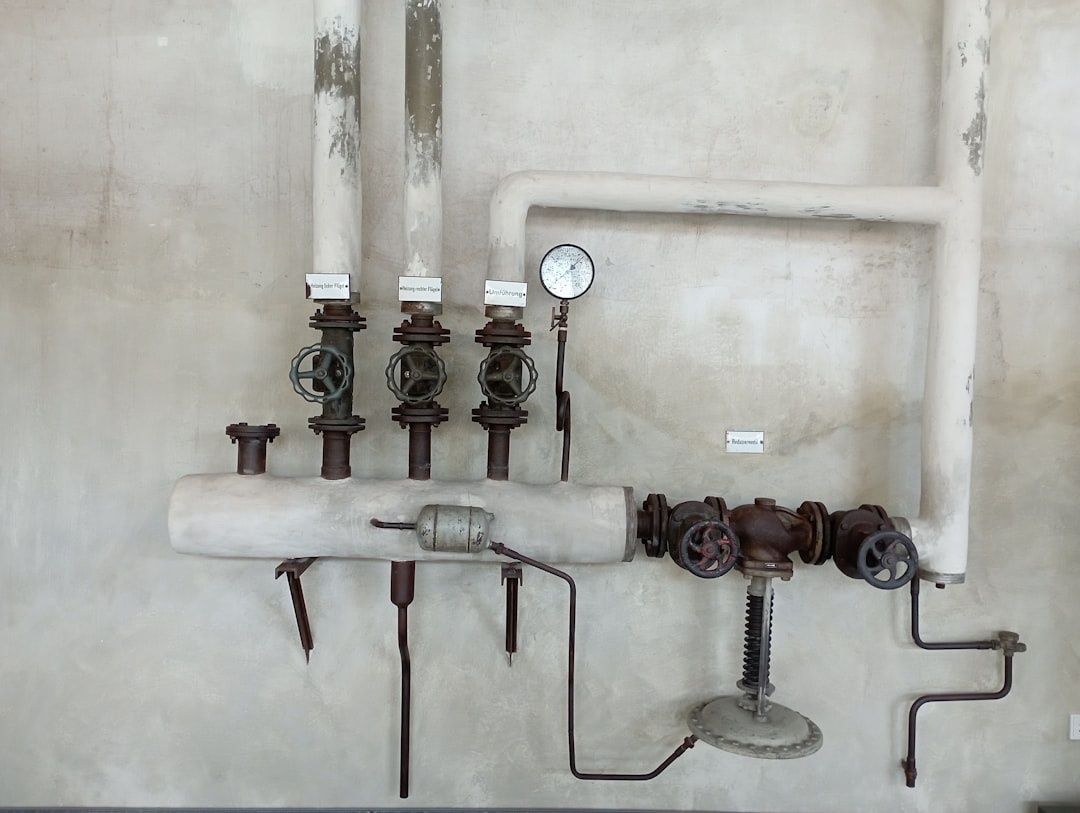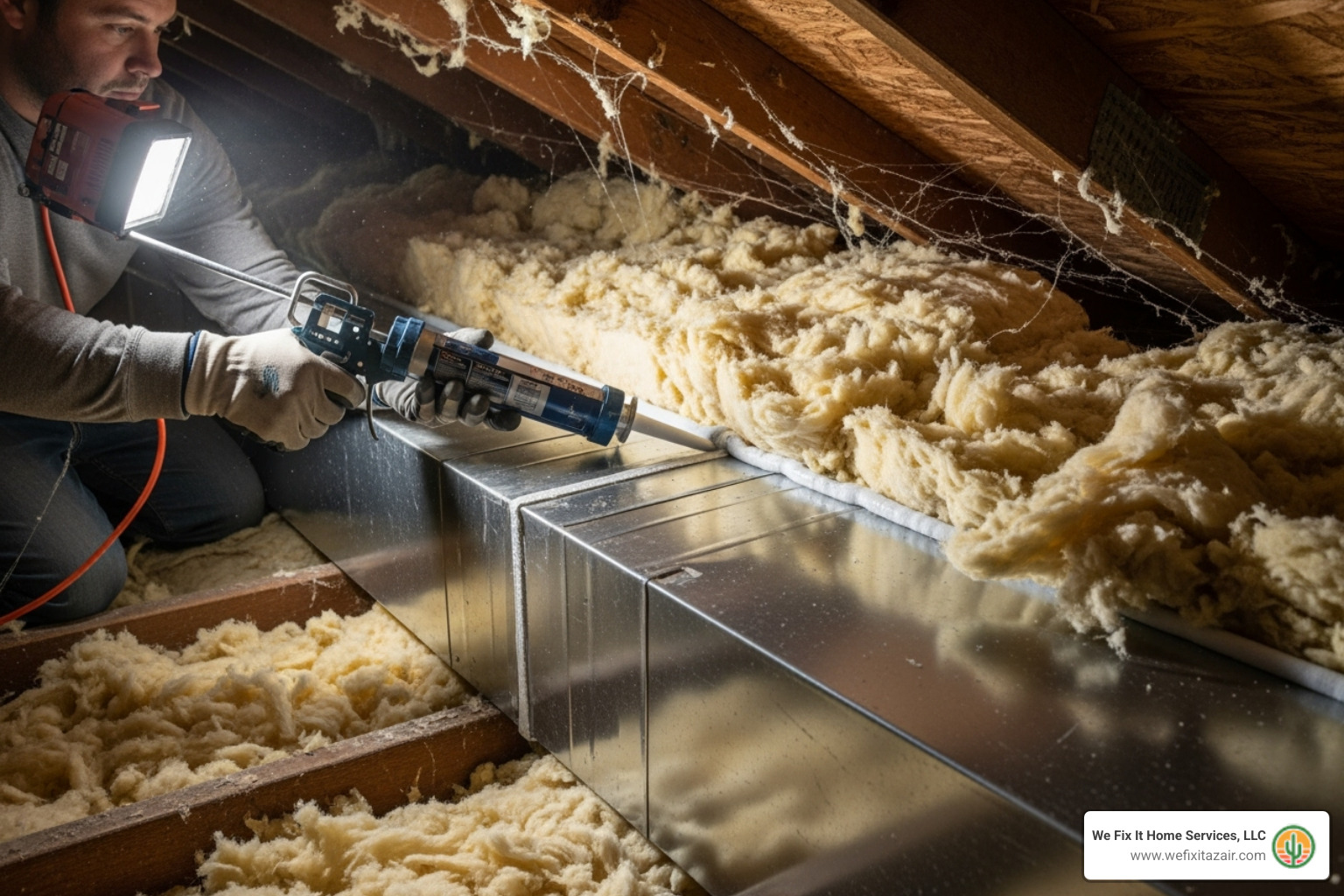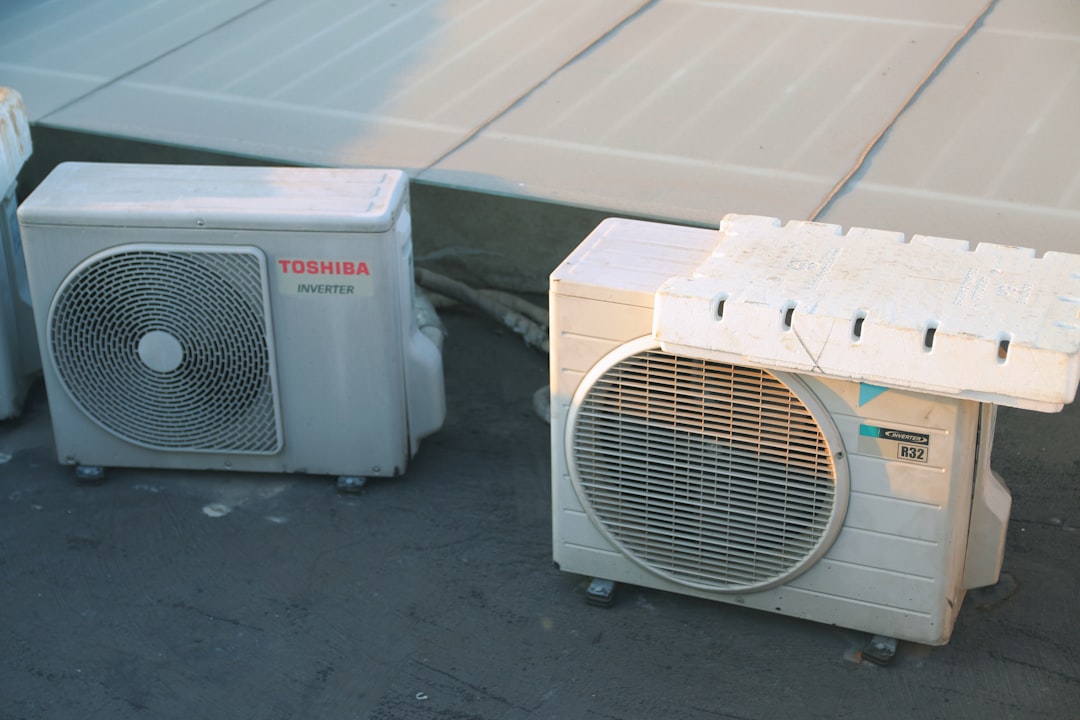The Freon Fiasco: What to Do When Your AC Leaks
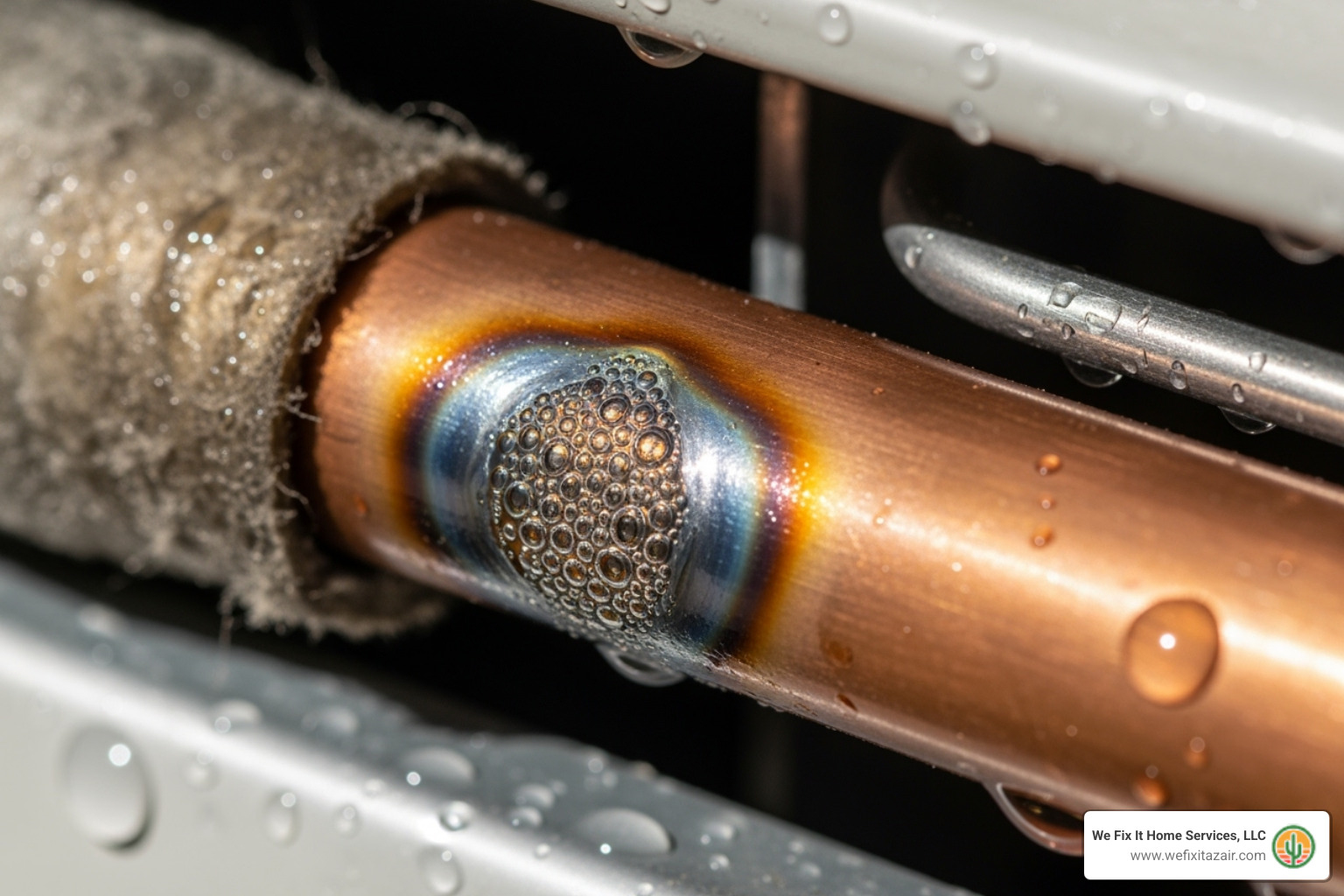
Understanding Your AC's Lifeblood
An AC Freon leak is a common yet serious problem, especially during Arizona's scorching summer months. When your AC isn't cooling properly, a refrigerant leak is often the culprit.
Quick AC Freon Leak Diagnosis:
- Warm air blowing from vents
- Ice buildup on copper refrigerant lines or evaporator coils
- Hissing or bubbling sounds from the outdoor unit
- Higher electricity bills without increased usage
- Longer cooling cycles
- Increased humidity indoors
- Oily residue around AC components
Refrigerant, often called Freon, is the chemical that makes air conditioning possible. It absorbs heat from inside your home and releases it outside. Unlike fuel in a car, refrigerant isn't consumed. Your AC operates as a sealed system, which means any loss of refrigerant indicates a leak.
Research shows that a refrigerant level that's off by just 10% can lead to a 10-20% drop in energy efficiency, forcing your system to work harder and driving up utility bills.
Most refrigerant leaks can be repaired by certified professionals, but this is not a DIY job. Handling refrigerants requires EPA certification and specialized equipment.
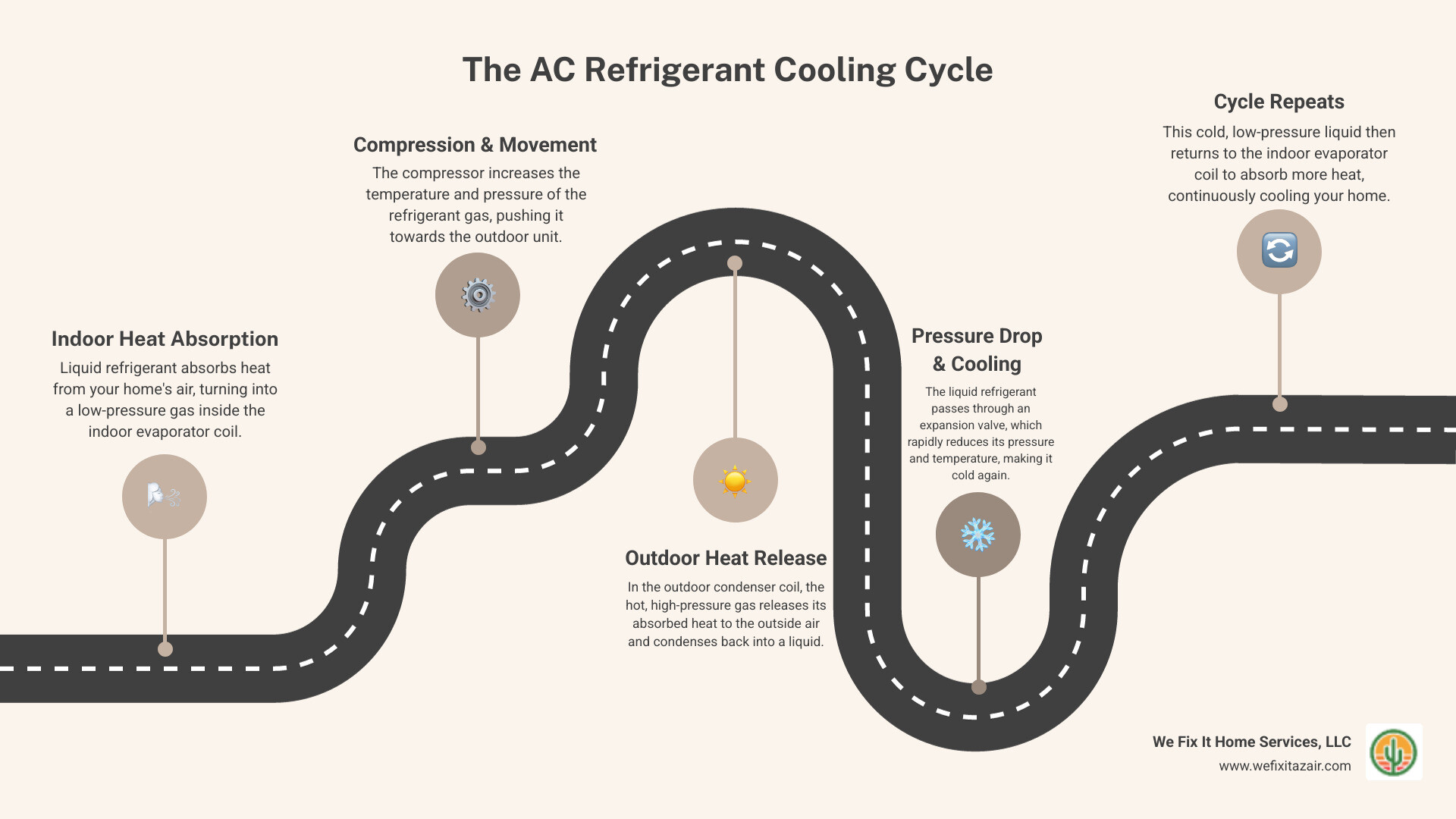
Diagnosing an AC Freon Leak: Telltale Signs and Detection Methods
When your home feels more like a sauna than a sanctuary, an AC Freon leak might be the invisible culprit. A dwindling refrigerant supply means your system loses its ability to transfer heat effectively. This puts immense strain on your AC's compressor, the heart of the system, and leads to higher utility bills. In fact, studies show that a 10% drop in refrigerant can cause a 10-20% decrease in energy efficiency.

7 Common Signs of a Refrigerant Leak
- Warm Air from Vents: If your AC is running but blowing lukewarm air, it's a strong indicator of low refrigerant.
- Ice or Frost on Copper Lines or Evaporator Coils: This might seem counterintuitive, but it's a classic sign of a leak. Low refrigerant causes the pressure inside the coils to drop, making the remaining refrigerant super-cool and freezing moisture from the air onto the coils or lines.
- Hissing or Bubbling Sounds: A distinct hissing sound often indicates pressurized refrigerant gas escaping, while bubbling might suggest a leak in a liquid line.
- Increased Electricity Bills: An AC unit with a leak must work much harder and run longer, consuming significantly more electricity.
- Longer Cooling Cycles: If your AC runs almost continuously and struggles to reach the thermostat setting, it's likely battling a refrigerant shortage.
- Increased Indoor Humidity: Refrigerant helps dehumidify the air. If your home feels sticky, your system may not be removing moisture effectively due to low refrigerant.
- Oily Residue on AC Components: Refrigerant circulates with oil to lubricate the compressor. A leak can allow this oil to escape, leaving a greasy residue near the leak point.
Common Causes of an AC Freon Leak
- Vibrations and Wear and Tear: Over years of operation, normal vibrations can cause tiny abrasions or cracks in refrigerant lines and coils.
- Metal Corrosion: Components can corrode over time. A common cause is formic acid, which can form from indoor air pollutants and eat away at the copper coils.
- Physical Damage: Lawn equipment, pets, or accidental damage during home projects can cause leaks.
- Factory Defects: Though rare, a manufacturing flaw can lead to a leak early in a unit's lifespan.
- Schrader Valve Failure: The seals within these small access valves can degrade over time, causing persistent leaks.
How Professionals Pinpoint a Leak
Since refrigerant is often an invisible gas, our NATE-certified technicians use specialized tools to find leaks:
- Electronic Leak Detectors: These sensitive devices "sniff" out refrigerant gas and sound an alarm when a leak is detected.
- Soapy Bubble Test: A simple but effective method where a soapy solution is applied to suspected areas. Escaping refrigerant will form bubbles.
- Ultraviolet (UV) Dye Test: A special UV dye is added to the refrigerant. It escapes with the refrigerant and glows under a black light, revealing the exact leak location.
- Nitrogen Pressure Test: For elusive leaks, the system is pressurized with inert nitrogen gas. Technicians can then monitor pressure or listen for hissing to find the leak.
- Visual Inspection: A thorough visual check for obvious signs like oily residue, corrosion, or physical damage.
The Risks and Realities of a Refrigerant Leak
An AC Freon leak is more than an inconvenience; it creates a ripple effect of serious consequences for your health, your wallet, and the environment.
When refrigerant levels drop, the compressor—your system's heart—works overtime, which can lead to premature failure and a costly replacement. The risks extend beyond your home, which is why EPA regulations for refrigerant handling are so strict. You need an EPA license to work with refrigerants, and improper handling can lead to significant penalties.
What to Do Immediately if You Suspect a Leak
If you suspect a leak, follow these critical steps:
- Turn off your AC system immediately. This prevents more refrigerant from escaping and protects the compressor from damage.
- Ventilate the area thoroughly. Open windows and doors to help disperse any fumes.
- Keep children and pets away from the affected areas, as they are more vulnerable to exposure.
- Call a certified technician right away. This is not a situation to delay or attempt a DIY repair.
- Resist the DIY temptation. Handling refrigerant is dangerous and can lead to massive fines from the EPA.
Health and Environmental Dangers
Refrigerant exposure poses serious health risks. Even brief contact can trigger dizziness, nausea, and respiratory irritation. More serious refrigerant poisoning can affect the central nervous system.
The environmental impact is also severe. Older refrigerants like R-22 Freon are known for ozone depletion. Even newer refrigerants have significant global warming potential, trapping heat in the atmosphere. An AC Freon leak is a serious situation that requires professional expertise to resolve safely and legally.
The Fix: Repairing the Leak and Restoring Your Comfort
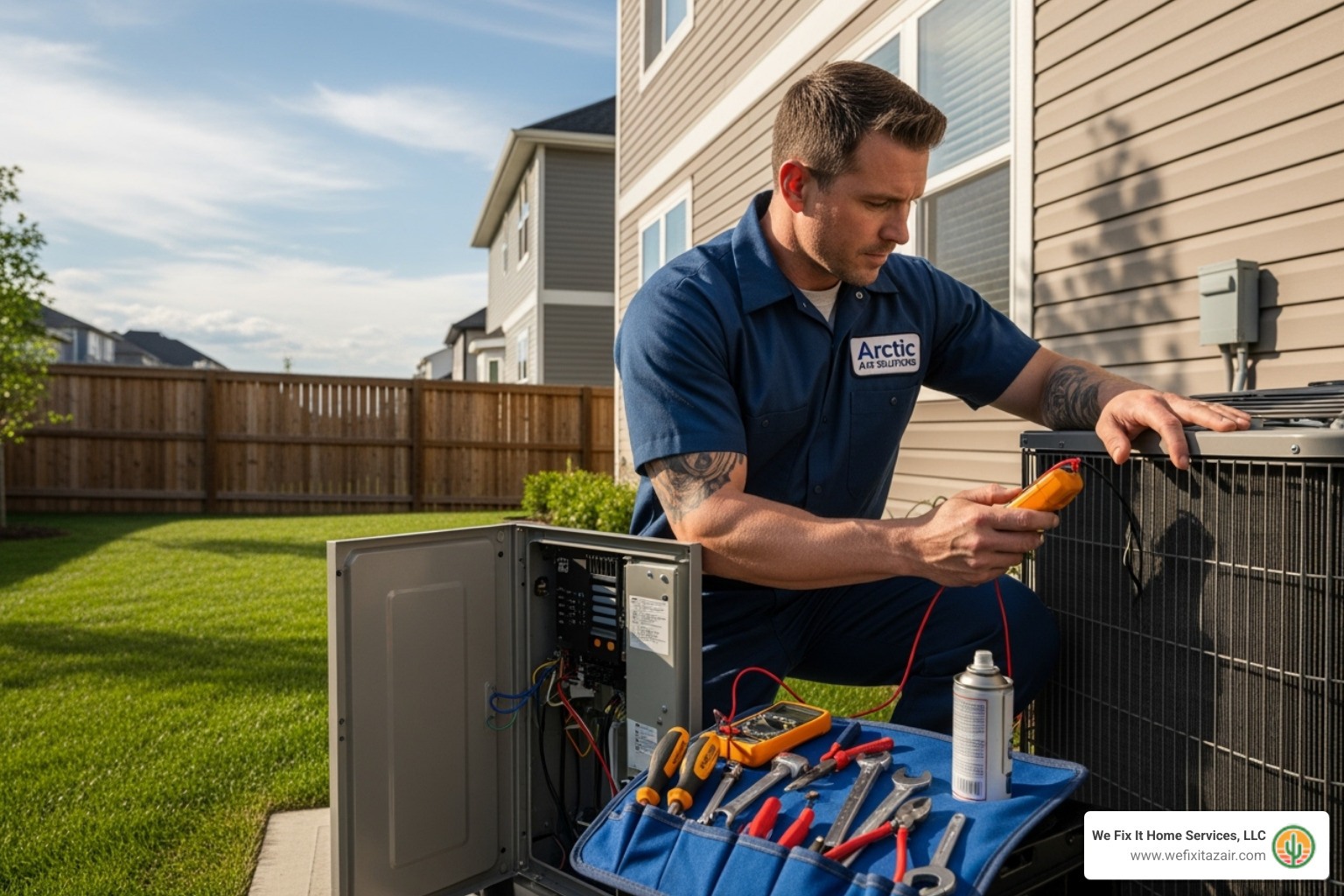
Finding an AC Freon leak is only half the battle—fixing it properly requires professional expertise and precision. This is a detailed, multi-step procedure that restores your system to peak performance, not a DIY project.
What are the Steps to Repair an AC Freon Leak?
Our NATE-certified technicians follow a proven process to ensure a lasting repair:
- Leak location and confirmation: We use specialized detection tools to pinpoint the exact source of the leak.
- Refrigerant recovery: Before any repair, we use professional equipment to safely recover all remaining refrigerant, as required by law.
- Repairing or replacing the leaking part: Small pinhole leaks in copper lines can often be fixed with brazing, a high-temperature welding process. For larger problems like a corroded coil, we will replace the entire part.
- System vacuuming: We use powerful vacuum pumps to remove all air and moisture from the refrigerant lines. Any contamination can wreck your compressor over time.
- Recharging with the correct refrigerant: The system is recharged with the precise type and amount of refrigerant. Too much or too little can cause damage.
- System testing: We monitor pressures and temperatures to ensure everything is running smoothly before we consider the job complete.
DIY vs. Professional Repair: Why You Must Call a Pro
When it comes to an AC Freon leak, this is absolutely not a DIY job for several critical reasons:
- Health Hazards: Refrigerant is a hazardous chemical that can cause serious health problems if you're exposed to it.
- Specialized Tools: Proper repair requires thousands of dollars in professional equipment, including leak detectors, recovery machines, and vacuum pumps.
- Legal Requirements: You need EPA Section 608 certification to handle refrigerants. The fines from the EPA for improper handling can be massive.
- Risk of Further Damage: An amateur repair can easily turn a simple leak into a catastrophic system failure, potentially destroying your compressor.
At We Fix It Home Services, our technicians have the training, tools, and certification to handle any AC Freon leak safely and effectively, giving you peace of mind.
Repair or Replace? Making the Right Financial Decision
When you find an AC Freon leak, you're faced with a crucial decision: should you repair the leak or invest in a brand new AC unit? This choice can feel overwhelming, but it's simpler when you consider a few key factors.
- Age: This is often the biggest deciding factor. A repair usually makes sense for a unit under 10 years old. If your AC is over 15, a leak might be a sign that it's time for retirement, as more problems are likely to follow.
- Refrigerant Type: If your unit uses the phased-out R-22 Freon, replacement is often smarter as R-22 is expensive and scarce. Systems using modern R-410A are more reasonable to repair.
- Repair Cost vs. Replacement Cost: A small leak in an accessible line is usually a straightforward repair. But if a major component like the evaporator coil has failed, the repair could be very expensive. We typically follow a simple rule: if the repair cost exceeds 50% of what a replacement would cost, replacement usually wins out financially.
Comparing When to Repair vs. When to Replace Your AC Unit
To help you make an informed decision, here are some common criteria:
| Criteria for Repair | Criteria for Replace |
|---|---|
| Unit is <10 years old | Unit is >15 years old |
| Uses modern R-410A refrigerant | Uses phased-out R-22 Freon |
| Minor, easily accessible leak | Major component failure (e.g., compressor, evaporator coil) |
| Repair cost is <50% of replacement cost | Frequent breakdowns and costly repairs |
| You plan to move within a few years | You plan to stay in your home for many years |
| Desire to avoid a large upfront investment right now | Desire for improved energy efficiency and lower utility bills |
| System still provides adequate cooling after repair | System struggles to cool even after repairs |
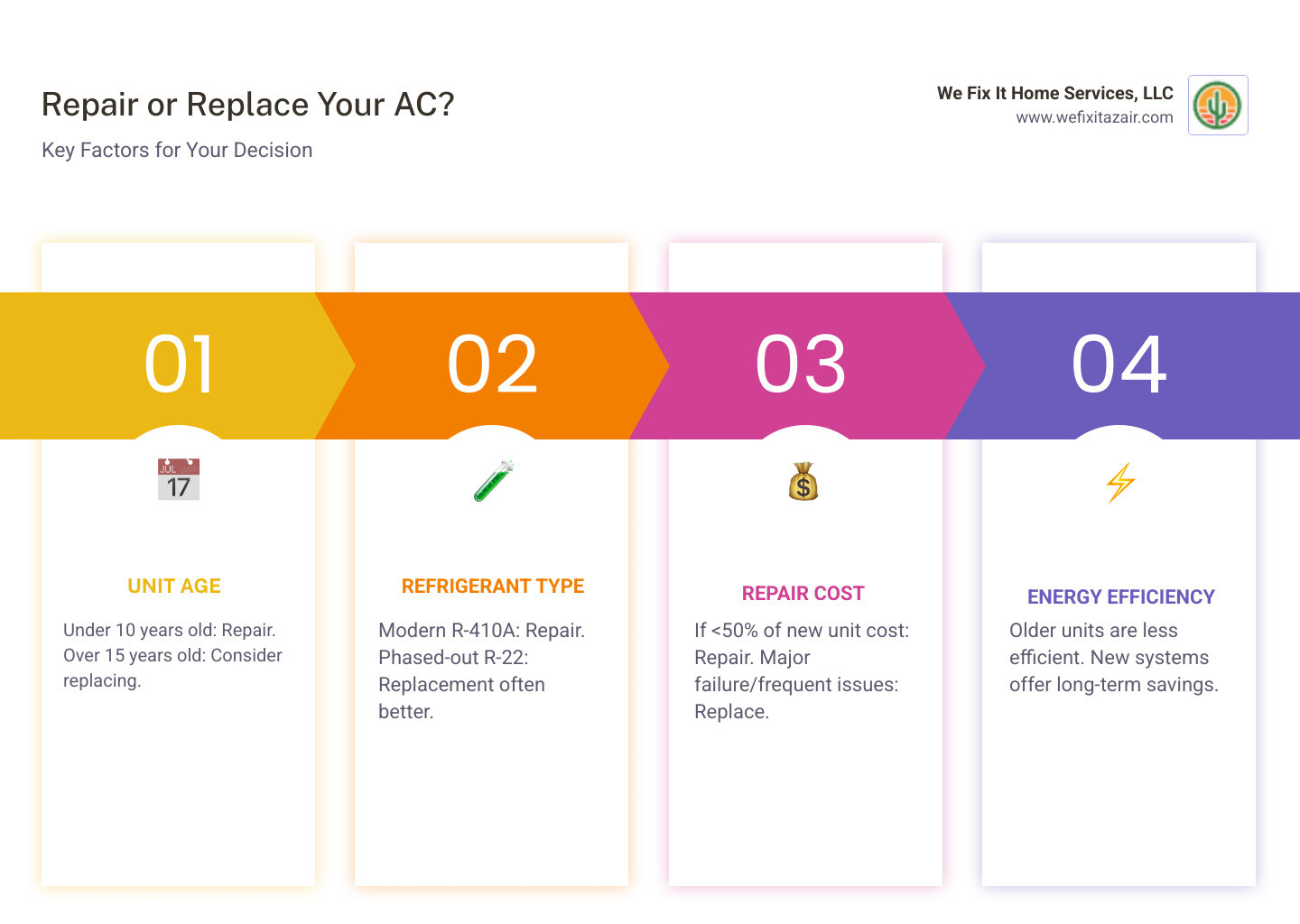
Your future plans also matter. If you're staying in your home long-term, investing in a new, high-efficiency system can provide years of reliable comfort and lower energy bills. Modern AC units are far more efficient, and the monthly utility savings can help the new system pay for itself over time.
We understand that a new AC is a big investment, which is why we offer flexible financing options. Our goal is to provide honest advice to help you make the best decision for your family and budget.
Frequently Asked Questions about AC Freon Leaks
We've been serving families across Pinal and Maricopa Counties for years, and certain questions about AC Freon leaks come up again and again. Let's clear up some of the most common confusion.
Is it normal for an AC system to lose Freon over time?
Absolutely not. This is a common myth. Your air conditioner operates as a sealed system and doesn't "burn through" refrigerant the way a car uses gas. If your refrigerant level is dropping, there is an AC Freon leak somewhere in the system. Any technician who suggests a simple "top-off" without finding and fixing the leak is providing a temporary solution at best—the refrigerant will just leak out again.
What's the difference between Freon and newer refrigerants?
"Freon" is a brand name for the older R-22 refrigerant. It was the standard for decades but was found to damage the Earth's ozone layer. As a result, its production was banned in 2020, making it expensive and difficult to source for repairs on older systems. Modern AC systems use newer, EPA-approved refrigerants like R-410A. These are much kinder to the environment and are used in more energy-efficient systems.
How can I prevent Freon leaks in the future?
The best way to reduce the risk of leaks is with regular professional maintenance. Just like your car needs regular oil changes, your AC system needs annual tune-ups. During a maintenance visit, our NATE-certified technicians can spot early warning signs like corrosion or worn parts before they cause a major AC Freon leak. A well-maintained system runs more efficiently and is less prone to the stress that leads to component failure, saving you from costly emergency repairs in the middle of an Arizona summer.
Stay Cool and Safe: Your Next Steps
Finding an AC Freon leak can be stressful, but it's important not to panic or take shortcuts.
The most important step you can take is preventative maintenance. Regular professional inspections catch small problems before they become expensive emergencies. Our experienced technicians know exactly what to look for and have the specialized equipment to detect even the smallest leaks before they become big problems.
At We Fix It Home Services, our family-owned company is built on treating every customer like family. Our NATE-certified technicians don't just fix problems—they take the time to explain what went wrong and how to prevent it from happening again. We proudly serve homeowners throughout Pinal County and Maricopa County, because we know how essential reliable air conditioning is in our desert climate.
Our NATE-certified technicians undergo continuous training to ensure every job is done safely, legally, and with lasting results.
If you suspect an AC Freon leak or notice any of the warning signs, don't wait. The longer you delay, the worse the problem will get. For expert diagnosis and safe AC repair in Mesa, AZ, trust our certified team to get the job done right. Attempting to repair refrigerant leaks yourself is illegal and dangerous. Let our professionals handle the work so you can stay cool and safe.




















Customer Testimonials






















